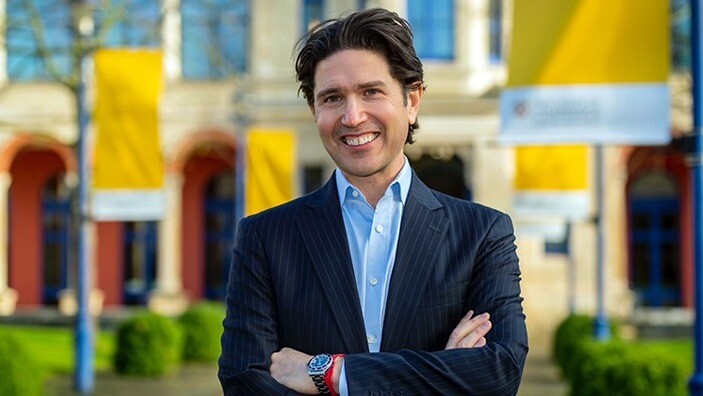
People around the world today are conscious of their ecological footprint, a term popularised in the early 2000s when oil giant BP created an online carbon footprint calculator for consumers to use.
This was a “subtle act of misdirection” by the energy company, argues Professor Christopher Marquis of Cambridge Judge Business School, because it cast responsibility on everyday citizens rather than the chief carbon producers – such as BP itself.
That’s a central theme of the new book authored by Christopher – ‘The Profiteers: How business privatizes profits and socializes costs’ – which examines how corporations boost profits by passing along huge costs to ordinary consumers rather than bearing those costs themselves, what he refers to as a ‘free lunch’.
Costs passed to consumers include inequality and discrimination
“The costs passed along to consumers rather than borne by companies include environmental damage and inequality that results in overall wealth decline and harm to key public services,” says Christopher, Sinyi Professor of Chinese Business at Cambridge Judge.
“I call the book ‘The Profiteers’ because the word ‘profiteering’ is commonly defined as the exploitation of market imperfections to generate unfair and excessive profit levels, and that’s just what businesses are doing by passing on these costs.”
Businesses promote consumer recycling over supply chain overhaul
“We should all consider our carbon footprints, but more than 70% of emissions in the past half century have been produced by only 100 companies that include BP and other fossil fuel companies. Surely, they bear the primary responsibility, but they are not bearing the costs.”
In addition to the ‘ecological footprint’ example, another way businesses pass on costs is by urging consumers to recycle (even though that’s a good idea) rather than reorganising supply chains to drastically reduce plastic usage. The term ‘litterbug’ was coined by plastic producers and the packaging industry in efforts to combat laws in US states that required returnable glass bottles, Christopher says, in the hope that people would “direct their energies to their individual garbage disposal habits” rather than the root cause of voluminous packaging materials that end up as waste.
We should all consider our carbon footprints, but more than 70% of emissions in the past half century have been produced by only 100 companies that include BP and other fossil fuel companies. Surely, they bear the primary responsibility, but they are not bearing the costs
Companies are challenging profit-driven norms with regenerative approaches
The book identifies companies that are bucking the profiteering theme, and Christopher says these can serve as models for a new regenerative economy in decades to come. These companies include retailer Patagonia, which uses regenerative cotton in its apparel, and floor covering firm Interface, which produces modular carpet tiles (so whole carpets need not be replaced if only one area is damaged) and also pioneered a model in which consumers in effect lease flooring from the firm – which does the maintenance and recycles the flooring, thus minimising waste.
“This is in sharp contrast to the approach of a company like Apple”, whose new phone models (sometimes with very few distinguishing features) may improve profits but also increases waste because a consumer’s old phone is usually discarded or stuffed into a drawer, writes Christopher.
Previous books by Christopher Marquis focus on China and the B Corp movement
The book, published on 14 May in the US by Public Affairs, an imprint of publishing company Hachette Book Group, follows recent previous books by Christopher on the B Corp movement (‘Better Business: How the B Corp Movement is Remaking Capitalism’), published in 2020, and China’s economy (‘Mao and Markets: The Communist Roots of Chinese Enterprise’), published in 2022.
A major theme of the new book is that companies’ self-professed devotion to environmental, social and governance (ESG) principles is a way to applaud themselves for “doing well by doing good” in a way that obscures the hidden costs passed through to broader society.
How asking the right questions is essential for tackling big issues
“A fundamental lesson I have aimed to impart to my students is the importance of focusing on the right questions,” Christopher writes. “Asking the wrong question can cause us to focus on wrong or even meaningless solutions and also miss the underlying causes of problems. Asking if doing well can lead to doing good is hardly the same thing as actually knowing how or why to deal with climate change and inequality.
“But doing well by doing good is an easy pill for the public to swallow, and companies know this. So they have built up this idea to obscure the fact that huge shares of their profits depend on hiding externalities and maintaining the legal, economic, and social systems that allow them to skirt responsibility for those costs.”
Asking the wrong question can cause us to focus on wrong or even meaningless solutions and also miss the underlying causes of problems. Asking if doing well can lead to doing good is hardly the same thing as actually knowing how or why to deal with climate change and inequality.
Firms should examine the whole value chain when it comes to emissions
Christopher also questions just how good some companies actually are when it comes to climate and other trumpeted goals. While Netflix has set net-zero goals, Christopher says these focus only on direct emissions from the likes of its hardware infrastructure, offices, billboards and delivery network – but not on enormous amounts of energy used by subscribers’ computers, phones and tablets to stream movies and other video content.
“Unless a company takes responsibility for acknowledging emissions of its whole value chain, it will likely use accounting tricks to only examine certain parts,” Christopher says.
Exploring externalities, innovative solutions and a regenerative economy
‘The Profiteers’ also explores the concept of ‘externalities’, which describes costs or benefits on others not reflected in the price of goods and services. These include not only obvious ones like carbon emissions but also often overlooked externalities such as inequality – which can lead to an overall decline in national wealth, lower tax revenues that harm services such as healthcare and education, and damaging resentment from left-behind parts of society.
The book is divided into 3 main parts:
1
Free lunch theme
The first part of the book, outlines the book’s main theme of the ‘Free Lunch’ enjoyed by business while society pays the bills.
2
Broken systems and innovative solutions
The second part of the book looks at ’Broken Systems and Innovative Solutions’ in areas such as carbon emissions, cheap goods and cheap labour, inequality and systemic discrimination.
3
Common good over profits
The third part of the book calls for a regenerative economy for the 21st Century with the common good rather than profits as the key goal.
Concept of shareholder value is evolving, but too slowly
Christopher’s research tracks the concept of shareholder value and the duty of company directors to court rulings in the US dating back to 1919. The idea that corporations exist mainly for shareholders then gained widespread currency with an influential 1970 New York Times Magazine article by conservative economist Milton Friedman entitled ‘The social responsibility of business is to increase its profits.
The pendulum is now swinging back to some degree, says Christopher, with the passage of benefit corporation laws in nearly 40 US states and many countries around the world that define a new type of company committed to creating longer-term values for a broader set of stakeholders rather than only shareholders. Yet such changes fail to delve into the governance of firms, and this is where Christopher focuses the latter third of his book.
Initiatives like crowdfunding and employee ownership can help reshape firm priorities
Recent governance initiatives include the use of shareholder resolutions to reorient company priorities, crowdfunding that reshape the relationship between companies and investors, employee ownership that democratise investment, and the Long Term Stock Exchange, which require that companies so listed commit to 5 long-term development principles that focus on long-term decision making, strategy and engagement while considering a broad set of shareholders.
“We need to acknowledge that what is needed is systemic change. For each of these individual ripples to eventually come together into a wave and create a new paradigm for responsible business, multi-sector, co-ordinated action is necessary,” Christopher concludes. “There will need to be scores of actions across many of these different domains: policy, markets, corporations, and individuals.”
Featured research
Marquis, C (2024) The Profiteers: How Business Privatizes Profits and Socializes Costs. PublicAffairs





